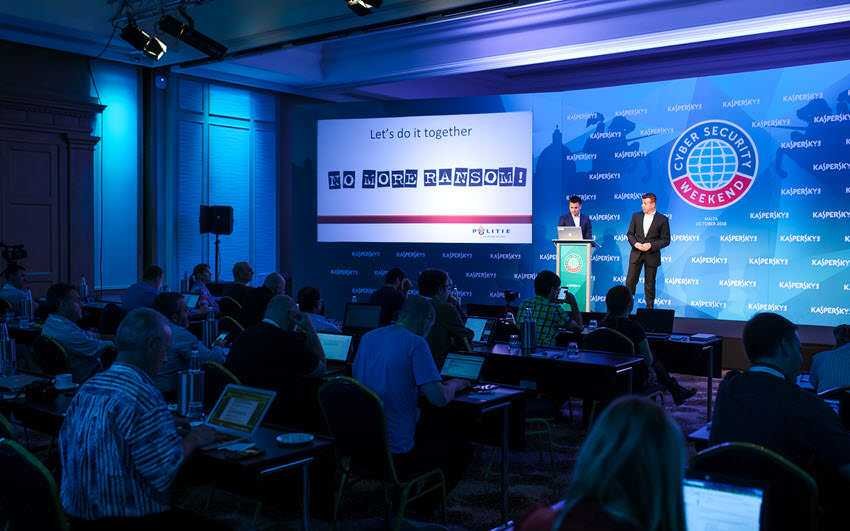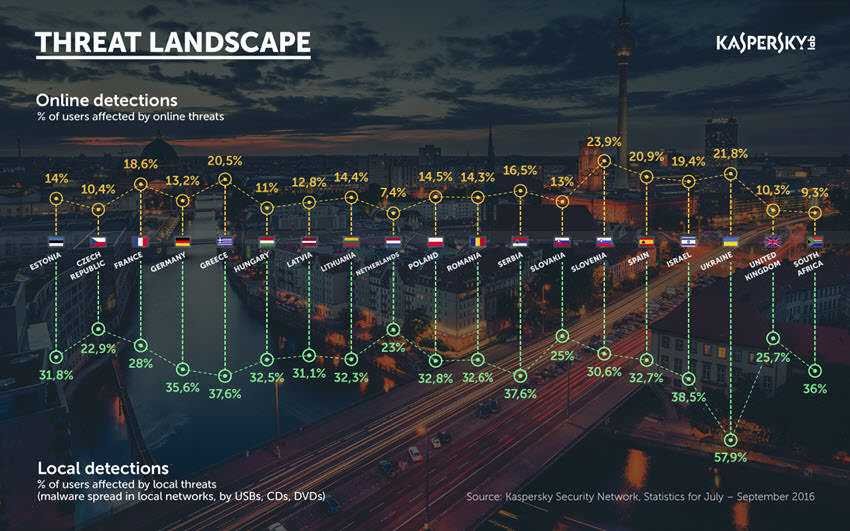Η Kaspersky Lab διοργάνωσε το ετήσιο συνέδριο Cyber Security Weekend στη Μάλτα, από τις 20 έως τις 23 Οκτωβρίου. Στην εκδήλωση παρευρέθησαν ειδικοί της εταιρείας, προσκεκλημένοι ομιλητές από την Αστυνομία της Ολλανδίας, δημοσιογράφοι αλλά και επιχειρηματίες από την ευρύτερη περιοχή, καθώς και από το Ισραήλ και τη Νότια Αφρική. Φέτος, ένα από τα βασικά issues του συνεδρίου ήταν τα προγράμματα ransomware – μια απειλή που θέτει σοβαρούς κινδύνους στα οικονομικά στοιχεία και δεδομένα τόσο καταναλωτών όσο και επιχειρήσεων, με ιδιαίτερη προσοχή να δίνεται στις ανάγκες ασφάλειας του τομέα της Πληροφορικής για μικρές και μεσαίες επιχειρήσεις.
Kaspersky Lab experts also conducted an overview of current digital threats and security trends, both globally and locally, and discussed the key threats to the region.
Kaspersky Lab's analysis of the threats faced by the IT sector in the third quarter of 2016 shows that in Europe, 33% of users had experienced security incidents related to local networks and removable media, and 15% has encountered Internet threats .
Statistics from the Kaspersky Security Network (Kaspersky Security Network) service for July-September 2016 show that Ukraine still has the highest number of users affected by local threats (57,9%), followed by Israel (38,5 %), Serbia and Greece (37,6%) and South Africa (36%). The largest number of incidents related to online threats were reported in Slovenia (23,9% of KSN users) and Ukraine (21,8%), followed by Spain and Greece. The Netherlands, South Africa, the United Kingdom and the Czech Republic have somewhat lower levels of threats: 7-10% of users were affected by online threats in these countries.
"Digital threats are evolving alongside technology and affecting all areas of personal and business experience. In addition to the fact that it simply multiplies rapidly, malware is also becoming more and more sophisticated, causing more damage. The programms ransomware is developing very quickly and is one of the main ongoing threats facing the IT sector. Our research shows that 40% of users today pay ransom when their data is encrypted, which only serves to satisfy digital criminals, explains Marco Preuss, Director of Kaspersky Lab's Worldwide Research and Analysis Group for Europe.
"Also new insights, inspired by the Internet of Things, appear on the horizon. We have already seen how "smart" TVs can be used to spy on their owners and how a "smart" door can be unlocked for unauthorized people. It is imperative to prepare for both current and future risks arising from these new devices. "
In 2015 and early 2016, Kaspersky Lab recorded over 2 millions digital incidents involving ransomware, many of which have attracted widespread public response. Compared to 2014-2015, the number of ransomware attacks in the business sector six times.
Kaspersky Lab's experts expect that with the growing use of ransomware programs by digital criminals, this type of malware could even outpaces bankers Trojans.
According to Corporate IT Security Risks Research held 2016, 20% of businesses worldwide have experienced at least one attack with a ransomware program over the last 12 months.
In Europe, this problem seems to be even more prevalent with 28% of companies experiencing a threat.
As for South Africa, the percentage here is slightly lower, reaching 19%. Ransomware is not limited to computer users, but has also been developed for mobile platforms. In the second quarter of 2016, 83.048 detected malicious installation packages developed for portable devices.
To help even more companies reduce the risk of 'infection' from ransomware programs, Kaspersky Lab has released a free Anti-Ransomware Business tool, coupled with special anti-ransomware features in its basic solutions. Furthermore, the Kaspersky Lab In cooperation with Europol, the Dutch Police and Intel Security launched the "No More Ransom" initiative, a website (www.nomoreransom.org) aimed at informing the public about the risks of ransomware programs and helping victims to retrieve their data without having to pay ransom to digital criminals. Among its members are 14 prosecution authorities in various countries.
«We have committed ourselves to contributing to the fight against digital crime and ransomware programs in particular, but we can only succeed by joining forces with other law enforcement and digital security companies. Digital crime is global, it does not know borders or borders, so we definitely need this cooperation. Together, with the "No More Ransom" initiative and other activities, we do our best to disrupt the activity of digital criminals and return the records to their legitimate owners without the need for ransom. We are also committed to doing everything that goes by our hand to inform users and organizations about this problem, as, unfortunately, there are no decryption tools for all the different types of ransomware programs. Back up your data and pay attention when you are online can substantially contribute to avoiding "contamination", said Ton Maas, Digital Coordinator of the Dutch Police.





